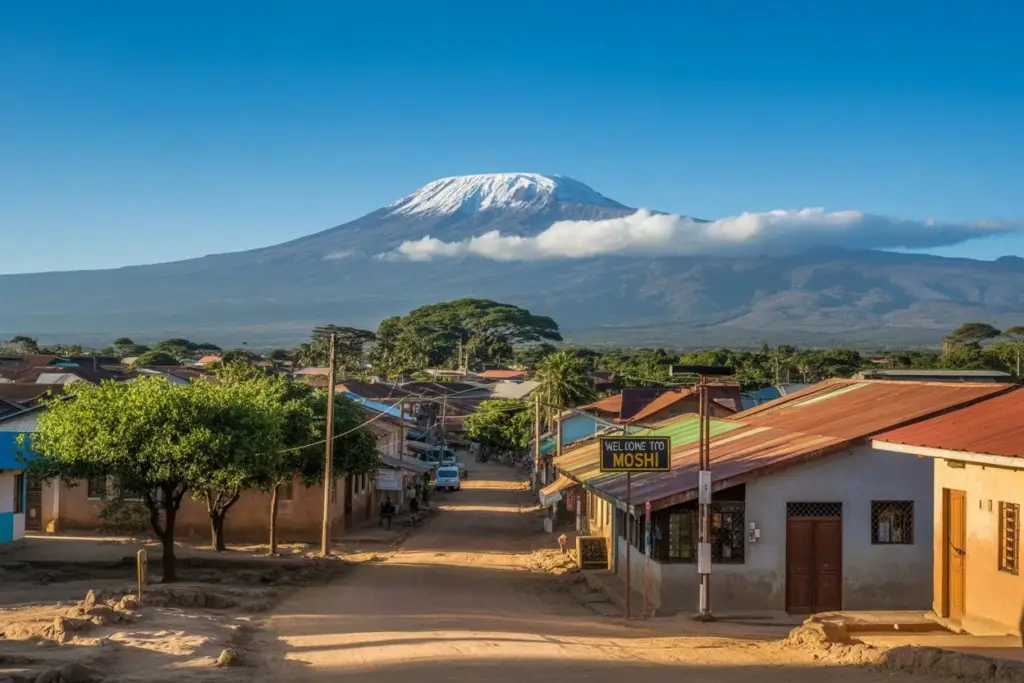Looking for the best things to do in Moshi, Tanzania? You’re probably planning your Kilimanjaro climb or safari and wondering if Moshi is worth more than just a night’s stay. The good news? It absolutely is. Travelers often miss out on its hidden gems—simply because they don’t know where to look.
As someone who’s guided countless safaris and treks across northern Tanzania, I can tell you: Moshi is packed with rich culture, stunning nature, and local charm. In this guide, I’ll walk you through the top things to do around Moshi—whether you’re staying a day or a week.
Nature Escapes in Moshi
If you’re staying in Moshi before or after your safari or Kilimanjaro climb, you don’t have to go far to find nature. The area around Moshi town is full of beautiful places where you can walk, relax, or enjoy the view.
Materuni Waterfall
Materuni Waterfall is one of the most popular day trips from Moshi—and for good reason. The walk to the waterfall takes you through green farms and small villages. It’s not a hard hike, and at the end, you’ll see a tall, powerful waterfall. You can even swim in the cold water if you like. It’s a great way to cool off and enjoy the outdoors.
Chemka Hot Springs (Kikuletwa)
Chemka is a warm natural spring, perfect for a relaxing afternoon. The water is clear and blue, and you can float for hours. It’s about an hour’s drive from Moshi, so many people visit after climbing Kilimanjaro or finishing a safari. Bring a swimsuit, towel, and maybe a snack—you’ll want to stay a while.
Lake Chala
Lake Chala sits on the border between Tanzania and Kenya. It’s a quiet place with a big blue lake in a volcanic crater. You can hike around the lake or enjoy the view. Some people even kayak here. It’s peaceful and not crowded, so it’s perfect if you want to get away from the busy tourist spots.
Rau Forest Reserve
This forest is close to Moshi and easy to reach. It’s a quiet place with big trees, birds, and monkeys. You can walk or ride a bike through the forest. There’s also a special old tree and some rice fields nearby. It’s a nice, calm trip for anyone who loves nature but wants to stay close to town.
Cultural Immersion in Moshi
There’s more to Moshi than just nature and mountains. If you’re curious about the local way of life, this is a great place to dive into Tanzanian culture. Whether it’s sharing a meal, learning how coffee is made, or meeting local communities—you’ll find plenty of real, hands-on experiences here.
Coffee Tours
Moshi is in coffee country, and joining a coffee tour is a must. You’ll visit a small farm, pick beans, roast them over an open fire, and grind them by hand—just like the locals do. It’s not just about coffee; it’s about connecting with the people who grow it and seeing the full journey from bean to cup. Plus, the final cup always tastes better when you’ve made it yourself.
Chagga Tribe Visits
The Chagga are the main tribe in this area, and their culture runs deep. A village visit gives you a close-up look at their traditions, homes, and farming life. You’ll hear stories passed down through generations, try local foods, and maybe even join in some music or dance. It’s a respectful and eye-opening way to understand the real Moshi.
Maasai Cultural Village
You’ve probably heard of the Maasai—and here, you can meet them in person. A visit to a Maasai village gives you a chance to learn about their unique dress, way of life, and deep connection to the land. They’re proud of their traditions and happy to share them with respectful visitors. You’ll leave with a deeper understanding of one of Africa’s most iconic tribes.
Local Markets
If you want to see daily life in Moshi, head to a local market. You’ll find colorful fabrics, handmade crafts, spices, and all kinds of fresh food. It’s also a great place to try street snacks or shop for souvenirs. Walk slowly, ask questions, and enjoy the friendly buzz—markets are full of stories if you take the time to listen.
Adventure Activities in and Around Moshi
If you’re like me, you don’t travel to sit still—and Moshi has just the right kind of adventure to keep things exciting without wearing you out. Whether you’re here before a big climb or winding down afterward, there are plenty of ways to stay active and soak up the scenery.
Day Hikes
You don’t have to summit Kilimanjaro to enjoy it. I often take guests on day hikes around the lower slopes of the mountain. These treks give you a feel for the terrain, fresh mountain air, and great views—without the full commitment of a summit. It’s also a perfect warm-up if you’re planning a longer climb.
City Walks
Sometimes the best way to explore Moshi is just by walking through it. I like to guide travelers through the local neighborhoods, markets, and old colonial buildings. You get to see daily life up close, talk to people, and stop at a few local spots for a snack or a cold drink. It’s relaxed, real, and always full of surprises.
Biking Tours
Cycling around Moshi is something I always recommend to adventure lovers. You can ride through coffee plantations, pass by little villages, and take in views of Kilimanjaro in the distance. The routes can be easy or challenging depending on what you’re up for. Either way, it’s a great mix of fun and fresh air.
Cooking Classes
Now, this one’s a different kind of adventure—right in the kitchen. I’ve taken travelers to local homes or small cooking schools where they learn how to make Tanzanian dishes from scratch. From ugali to banana stew, you’ll chop, stir, and taste your way through a meal. It’s hands-on, tasty, and a great way to connect with the culture.
Wildlife Safaris Near Moshi
One of the best parts about being based in Moshi is how close we are to some of Tanzania’s top national parks. Whether you’re here for a short trip or adding a safari after your Kilimanjaro trek, there’s no shortage of unforgettable wildlife moments waiting for you.
Tarangire National Park
Whenever I want to show guests something different, I take them to Tarangire National Park. It’s famous for its massive elephant herds and those iconic baobab trees. The park feels less crowded than others, which makes the experience feel even more special. If you visit during the dry season, animals gather around the river—and that’s when the sightings really get exciting.
Ngorongoro Crater
This place is a must-see. I’ve been lucky enough to visit the Ngorongoro Crater many times, and it still takes my breath away. You drive down into what feels like a giant natural zoo—lions, buffaloes, zebras, hippos, and rhinos, all in one compact area. The views from the rim alone are worth the trip, but the real magic happens inside the crater.
Serengeti National Park
Everyone’s heard of the Serengeti, and for good reason. If you’re timing your visit right, you can witness the Great Migration—thousands of wildebeest and zebras on the move. I never get tired of the wide-open plains, the big cats lounging under acacia trees, and those golden sunsets that make every photo look like a postcard.
Lake Manyara National Park
Lake Manyara is often my go-to for a day safari. It’s small, easy to explore, and full of surprises—like lions that climb trees (yes, really). You’ll also spot flamingos, monkeys, and elephants moving through the forest. It’s a great warm-up before heading to the bigger parks.
Accommodations in Moshi
Whether you’re climbing Kilimanjaro, heading out on safari, or just passing through, Moshi has a place to stay that fits your travel style and budget.
I’ve seen travelers enjoy everything from basic hostels to boutique hotels with mountain views. If you’re climbing, it’s smart to stay somewhere that’s used to hosting trekkers—early breakfasts, gear storage, and helpful staff make a big difference.
One of my favorite spots is Aishi Machame Hotel. It’s tucked away in a quiet area, surrounded by nature, and has a really peaceful vibe. Great food, friendly service, and a view of Kilimanjaro on clear days—what more could you want?
Practical Information for Visiting Moshi
If it’s your first time in Moshi, a few tips will make your trip smoother. I always share this advice with friends and clients before they arrive.
Best Time to Visit
June to October is the dry season and perfect for both safaris and climbing. January and February are also great for trekking. If you want fewer crowds, the short rains (March to May) can still be enjoyable—bring a rain jacket.
Getting Around
Moshi is small, and most places in town are walkable or a short taxi ride away. For day trips, I recommend booking through a trusted local guide or your hotel. It’s safer, and you’ll get a lot more value out of your experience.
Safety and Customs
Moshi is friendly and welcoming, but like anywhere, keep an eye on your belongings. Dress modestly, greet people with a smile, and learn a few Swahili words—it goes a long way. If you’re unsure about something, ask. People here are happy to help.
Frequently Asked Questions
Do I need to book activities in advance?
If you’re climbing Kilimanjaro or planning a safari, yes—book ahead, especially during high season. For local tours and short trips, you can often arrange them once you’re in Moshi.
Is Moshi safe for solo travelers?
Yes, it’s one of the safer towns in Tanzania. I meet solo travelers all the time, and they usually find it easy to get around and meet others. Just take normal precautions.
Can I use credit cards in Moshi?
Some hotels and tour companies accept cards, but most shops and restaurants prefer cash. There are ATMs in town, but they don’t always work with international cards, so come prepared.
What should I pack for Moshi?
Comfortable clothes, walking shoes, sunscreen, a hat, and a light jacket for evenings. If you’re hiking or heading on safari, ask your guide for a full list based on your plan.
Conclusion
Moshi may be the gateway to Kilimanjaro, but it’s much more than just a starting point. It’s a place where nature, culture, and adventure come together. Whether you’re sipping coffee in a Chagga village, biking past banana fields, or spotting lions in the wild—you’ll find something here that sticks with you.
If you’re heading to Tanzania, don’t just pass through Moshi. Slow down, explore, and let this little town surprise you.





